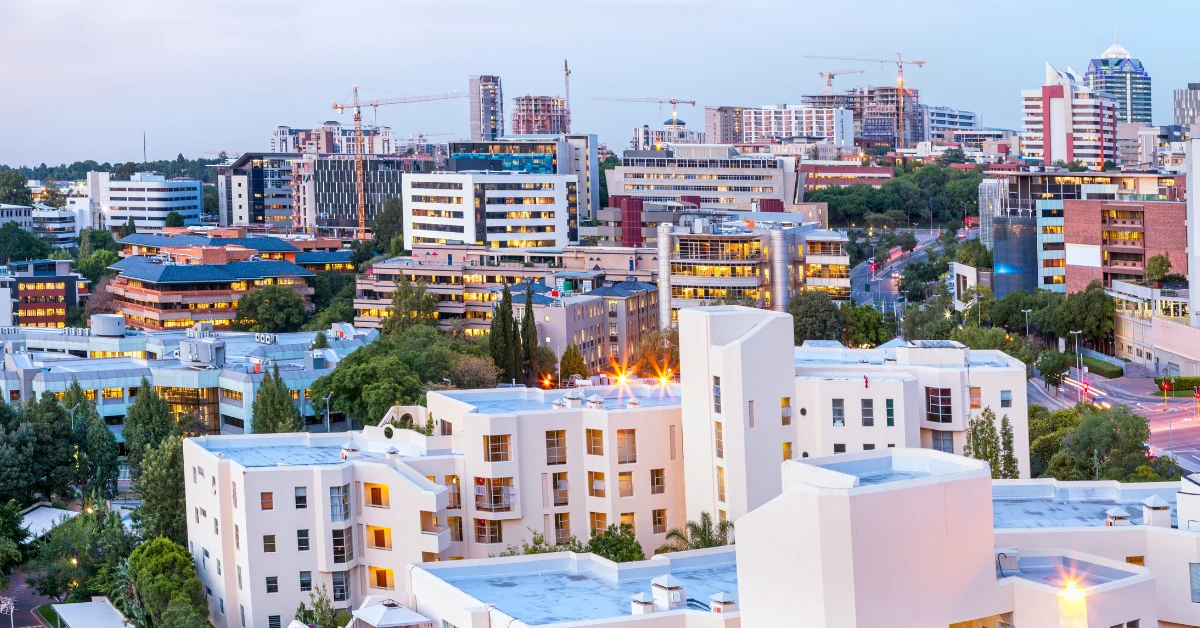The Best Guide To Johannesburg North Attractions
The Best Guide To Johannesburg North Attractions
Blog Article
Johannesburg North Attractions Things To Know Before You Get This
Table of ContentsWhat Does Johannesburg North Attractions Do?An Unbiased View of Johannesburg North AttractionsIndicators on Johannesburg North Attractions You Need To KnowFascination About Johannesburg North AttractionsThe Ultimate Guide To Johannesburg North AttractionsExcitement About Johannesburg North Attractions
The city owes its place to the existence of a much more precious source: gold. The city expanded on the edge of the Witwatersrand Main Coral reef, a subterranean stratum of gold-bearing quartz-silica empire that arcs for hundreds of miles beneath the Highveld. Most of the gold mines in the city stopped operation in the 1970s, but in its day the Witwatersrand gold sector represented greater than 40 percent of the globe's yearly gold manufacturing.Johannesburg has a pleasant climate. Summer temperature levels balance regarding 75 F (24 C); winter months temperature levels average concerning 55 F (13 C) and just periodically dip listed below cold. The city delights in about 8 hours of sunshine each day in both winter months and summertime. Rain standards regarding 28 inches (700 millimetres) per annum, but the total varies significantly from year to year.
What rain the city receives falls practically exclusively in the summer season, typically in incredible late-afternoon electrical tornados. Air contamination postures a significant problem, specifically in the cold weather, when thermal inversions restrain the westward circulation of air from the Indian Sea. Pollution is most serious in the densely worked out Black municipalities on the city's periphery, where many residents still depend on coal for fuel.

Johannesburg North Attractions Fundamentals Explained
The equilibrium of the city is occupied by whites. Holiday accommodation differs in personality and quality.
Physical development, although rather restricted by transportation, proceeded promptly as immigration to South Africa, and Johannesburg in particular, raised significantly.
A lot of inadequate residential areas were blended, with poor blacks and whites living with each other, although the wealthy suburban areas were usually booked for whites.
The previous system of eleven numbered areas was reorganised in 2006. Marshalltown, as seen from the top of the Carlton Centre. The M1 and M2 run behind the buildings, and the southern suburban areas expand past the freeway limit. The central city of Johannesburg is located within the city's Area F. The number of individuals living in the inner city on a casual basis is unidentified, as many are unlawful immigrants. The unemployment, education, and age profiles of the location are all unknown, due to the difficulty of obtaining reputable information about the area.
Johannesburg North Attractions - Questions
Centred on the CBD, the region includes the suburban areas of Yeoville, Bellevue, Troyeville, Jeppestown, and Berea to the east. To the west it infects Pageview (Johannesburg North attractions) and Fordsburg. There are tiny industrial parks to the south, such as City West-Denver and Benrose. Around 800,000 commuters travel through the inner city daily, and it operates as a local shopping node for site visitors from the southerly suburbs. Yeoville and Bellevue have a mix of home buildings and solitary household systems on small lots. The region is situated on a mountainous divide that runs from eastern to west.

Johannesburg Arena, a training school for both the Golden Lions and Orlando Pirates, is adjacent. The eastern residential areas of Johannesburg are located in the city's 7th [] and 9th [] regions. The area is additionally functionally integrated with East Rand border towns outside of the official border of Johannesburg, such as Bedfordview and Edenvale (both component of Ekurhuleni Metropolitan Municipality).
The Buzz on Johannesburg North Attractions
R. Tambo International Airport). The eastern residential areas are some of the oldest areas of Johannesburg, there are big neighborhoods of Jewish and various other European backgrounds, the majority of the populace is English speaking. There are 3 fairway along with a variety of protected ridges with viewsites. There are a number of well-developed and up-market enjoyment and purchasing locations in the east such as the Eastgate Buying Centre and the Greenstone mall.
Originally developed to house male migrant workers, many have actually been improved as houses for pairs and households. The residential area was not historically permitted to produce employment centres within the location, so almost all of its homeowners are travelers to other components of the city.
Some Known Details About Johannesburg North Attractions
The N1 Western Bypass links the north suburban areas with the north-western suburban areas. The household locations in the north suburbs are mostly formal, without any significant locations of casual housing, or real estate that lacks a long-term framework. review Although this is a recognized location, there is a pattern of land use adjustment from domestic to business, particularly along primary arterial roads and around well-known nodes.
The area is well linked to roadway networks, specifically along the north-south axis developed by the M1 and N1. Roads to the east and west are much less well established, as there are no highways travelling in that direction. Towards the north border of the city, the thickness of development reduces, leaving huge locations of primitive land around Midrand.
Johannesburg North Attractions - The Facts
, which is situated on a hill ignoring the inner city and Hillbrow.
Report this page